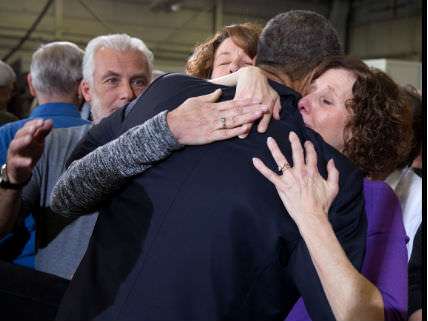Putting Himself in the Other Person's Shoes, Obama Says Gun Control Opponents Abet Murder

Speaking about gun control in Denver yesterday, President Obama declared, "We've got to get past some of the rhetoric that gets perpetuated that breaks down trust and is so over the top that it just shuts down all discussion." I agree. Here is an example of such debate-squelching rhetoric, drawn from the speech surrounding the president's call for calm and rational discussion:
It's now been just over 100 days since the murder of 20 innocent children and six brave educators in Newtown, Connecticut—an event that shocked this country and I think galvanized parents all across the country to say, we've got to do something more to protect our kids. But consider this: Over those 100 days or so, more than 100 times as many Americans have fallen victim to gun violence. More than 2,000 of our fellow citizens, struck down, often because they were just going about their daily round. They weren't doing anything special. Just doing what folks do every day—shopping, going to school. Every day that we wait to do something about it, even more of our fellow citizens are stolen from our lives by a bullet from a gun.
Here Obama is not-so-subtly charging his political opponents with complicity in murder. If Congress passes his "common-sense proposals," the president avers, fewer people will be killed by guns. Therefore if legislators refuse to "do something," they have the blood of innocent children on their hands. This is the same emotional appeal Obama has been making since December, when he said that if you don't agree with him about gun control you are in effect saying "we're powerless in the face of such carnage" because "the politics are too hard."
Why would anyone oppose new gun controls? Not for any decent, honorable, or principled reason that the president is willing to concede:
There's no reason we can't do this unless politics is getting in the way. There's no reason we can't do this….
Most of these ideas are not controversial….
There are already some senators back in Washington floating the idea that they might use obscure procedural stunts to prevent or delay any of these votes on reform.
Think about that. They're not just saying they'll vote "no" on the proposal that most Americans support. They're saying they'll do everything they can to avoid even allowing a vote on a proposal that the overwhelming majority of the American people support. They're saying your opinion doesn't matter.
We knew from the beginning that change wouldn't be easy. And we knew that there would be powerful voices that would do everything they could to run out the clock, change the subject, ignore the majority of the American people. We knew they'd try to make any progress collapse under the weight of fear and frustration, or maybe people would just stop paying attention.
Obama refuses to entertain the possibility that his opponents have any comprehensible motivation at all, aside perhaps from sheer partisan perversity, let alone that they might be doing what they believe to be right. This demonization of the opposition sits rather uneasily with Obama's comment in the same speech that "there are good people on both sides of this thing, but we have to be able to put ourselves in the other person's shoes." He worries that "both sides of the debate sometimes don't listen to each other," that "people who take absolute positions on these issues, on both sides, sometimes aren't willing to concede even an inch of ground." And he wonders, "How do you build trust?"
Here is a good way to start: Stop assuming that you have a monopoly on virtue or empathy and stop arguing, whether implicitly or explicitly, that people who disagree with you about the merits of particular gun policies simply don't care enough about the mass murder of children. At the top of the White House website right now is a link to "The President's Plan to Reduce Gun Violence." The headline over the link: "We Have Not Forgotten." The implication: The people on the other side of the debate have,
A New York Times story about Connecticut's recently enacted hodpodge of gun controls illustrates what Obama is trying to achieve through his heart-tugging campaign of moral intimidation:
Senator Michael McLachlan, a Danbury Republican, said that much in the bill made him uncomfortable, but that the Newtown shooting "changed a lot of people's viewpoints on a lot of things, on the preciousness of life, on the priority of our lives, and it certainly affected me in a very great way."
"Under different circumstances, I would look at this bill very differently," he said, "But today I'm supporting this bill in hopes that I am properly honoring Caroline Phoebe Previdi."
In other words, McLachlan supported what he concedes is a bad law because he felt a need to "do something," as the president puts it. Surely there is a better way to honor the dead.


Show Comments (135)